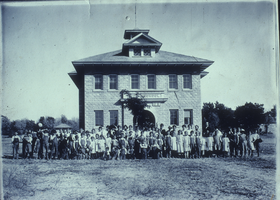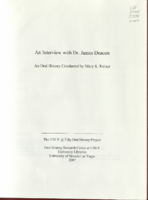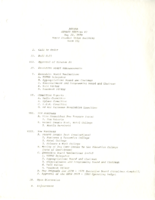Search the Special Collections and Archives Portal
Search Results

Gene Noboru Nakanishi oral history interview: transcript
Date
Archival Collection
Description
Oral history interview with Gene Noboru Nakanishi conducted by Ayrton Yamaguchi, Cecilia Winchell, and Stefani Evans on April 2, 2021 for Reflections: The Las Vegas Asian American and Pacific Islander Oral History Project. Gene Nakanishi shares his detailed family history from both his father's and his mother's families. He discusses his paternal grandfather's work on the Union Pacific Railroad, the family's internment in Wyoming during World War II, and his father's release from the camp by joining the United States Army Signal Corps. Nakanishi also talks of his maternal grandfather who was of the Bushido ("warrior") class in Osaka, Japan, and his grandfather's work with Christian missionaries. He shares details of his mother's restaurant employment in Los Angeles and her opening of Osaka Japanese Bistro in Las Vegas in 1969. Nakanishi also talks about being born and raised in Las Vegas, his musical schooling at Berklee College of Music in Boston, and his graduate education at Harvard University. He discusses his work as a band teacher for the Clark County School District, his involvement in the Idyllwild Arts Summer Program band camp, and his interests in jazz music.
Text

Photograph of Panaca Grammar School, Panaca, Nevada, circa 1916
Date
Archival Collection
Description
Image

Chelsie Campbell interview, January 9, 2019: transcript
Date
Archival Collection
Description
Chelsie Campbell is a Cuban-American attorney and lobbyist. Born on October 4, 1979, Chelsie is a native Nevadan and grew up in Las Vegas. Her mother, Norah Campbell, came to Las Vegas after the Cuban Revolution and works as an elementary school teacher. Her father, Alan Campbell, was a former teacher and hotel manager. An advocate for the Latino community, Chelsie has dedicated her life to advocacy. Her involvement began at UNLV where she found her voice through the Student Organization of Latinos (SOL). During her time with SOL, she advocated for the elimination of the social security requirement in UNLV’s admission process and lobbied for the retraction of Las Vegas Review Journal’s racist article on Latino students. Her activism in SOL also helped established additional SOL chapters across Las Vegas high schools and at the College of Southern Nevada. After earning her Bachelors in Broadcast Journalism and Spanish Literature from UNLV, Chelsie attended William S. Boyd Law School where she graduated in 2005. Chelsie also attended University of Nevada, Reno where she received her master’s in Management and a graduate certificate in renewable energy. Chelsie worked for Mach One Group as Editor-In-Chief of its two publications, Nevada Family Magazine and La Familia de Nevada. After law school, Chelsie began working at NV Energy as a spokesperson and worked her way up to government affairs. Chelsie is currently working as an independent lobbyist and choses her clients. Her clients include Clark County School District and NV Energy. Her work as a lobbyist includes helping agencies prepare for Nevada’s legislative session, conduct public policy research, and help with educational outreach. Through her activism, Chelsie has worked for former Senate Majority Leader, U.S. Senator Harry Reid. Chelsie is also part of the inaugural class of Emerge Nevada, a political leadership-training program for women in Nevada. Chelsie is on the Board of Trustees for the Leukemia and Lymphoma Society of Southern Nevada, the Chairwoman for the Nevada Advisory Board for CPLC Southwest, Board Member for the Advisory Commission on law-related Education for the State Bar of Nevada and serves on the Governmental Affairs Committee for the Latin Chamber of Commerce. She is the former President for the Boyd Law School Alumni Chapter and the Board of Directors for the Gray Plunkett Jydstrup Living Facility. Chelsie would like to dedicate her oral history to her parents: Without them, I wouldn’t be here.
Text
Glynda White oral history interviews
Identifier
Abstract
Oral history interviews with Glynda White conducted by Claytee D. White on March 12, 2013 and August 23, 2014 for the African Americans in Las Vegas: a Collaborative Oral History Project. Glynda White begins by discussing her upbringing in Jackson, Tennessee, where her father was a member of the local National Association for the Advancement of Colored People (NAACP) and was involved in the litigation to desegregate schools in the city. She explains how her father's activism inspired her to pursue a legal career and go to law school after graduating from Lambuth University. White discusses arriving in Las Vegas, Nevada in the 1970s to work as a teacher, later being on the board of the Las Vegas NAACP and working for the Nevada Black Chamber of Commerce. She describes her role at the College of Southern Nevada as a lead faculty member for the Department of Business Administration and Legal Studies, her teaching, and the work she has done to establish African American businesses in the Westside area of Las Vegas, as well as in North Las Vegas, Nevada.
Archival Collection
Clarence Lawrence oral history interview
Identifier
Abstract
Oral history interview with Clarence Lawrence conducted by Rhonda Davis on April 11, 2006 for the Public School Principalship Oral History Project. In this interview, Lawrence reflects upon his career as a teacher and administrator in Milwaukee, Wisconsin. He discusses his approach to school administration, and his working relationship with teachers and other administrators. He describes his regular responsibilities and challenges as principal, and discusses how different experiences shaped his approach to administration. He also offers suggestions for individuals interested in pursuing school administration, and describes what he believes makes an effective school administrator.
Archival Collection
#70413: UNLV Creates held in Cox Pavilion August 21, 2015 at the University of Nevada, Las Vegas. Rehan Choudhry, creator of the Life is Beautiful Festival Emily Salisbury, criminal justice professor -- Brendan O'Toole, director of the Mendenhall Innovation Program in the Hughes College of Engineering Steven Clarke, architecture professor Paul Oh, mechanical engineering professor Len Jessup and Student Body President Kanani Espinoza, 2015 August 21
Level of Description
Archival Collection
Collection Name: University of Nevada, Las Vegas Creative Services Records (2010s)
Box/Folder: Digital File 00
Archival Component

Transcript of interview with Dr. James Deacon by Mary K. Keiser, August 24, 2006
Date
Archival Collection
Description
Text
Donald G. Anderson oral history interview
Identifier
Abstract
Oral history interview with Donald G. Anderson conducted by Jacqueline Buettner on May 01, 2005 for the Public School Principalship Oral History Project. In this interview, Anderson reflects upon his 30-year career as an elementary school teacher and administrator with the Clark County School District from the 1970s to the 2000s. He discusses his upbringing, and how his own pursuit of education led to his becoming a teacher and administrator. He describes his philosophy of education, and discusses how it evolved with different experiences.
Archival Collection

Meeting minutes for Consolidated Student Senate, University of Nevada, Las Vegas, May 22, 1979
Date
Archival Collection
Description
Text
Barbara Rosenberg oral history interview
Identifier
Abstract
Oral history interview with Barbara Rosenberg conducted by Rebecca Richey on April 22, 2002 for the Public School Principalship Oral History Project. In this interview, Rosenberg reflects upon her nearly 40-year career as a teacher and administrator in New York and Nevada from the 1960s to the 2000s. She discusses her approach to school administration, and describes her regular responsibilities. She also compares her different roles as teacher, dean, assistant principal, and principal.
Archival Collection
